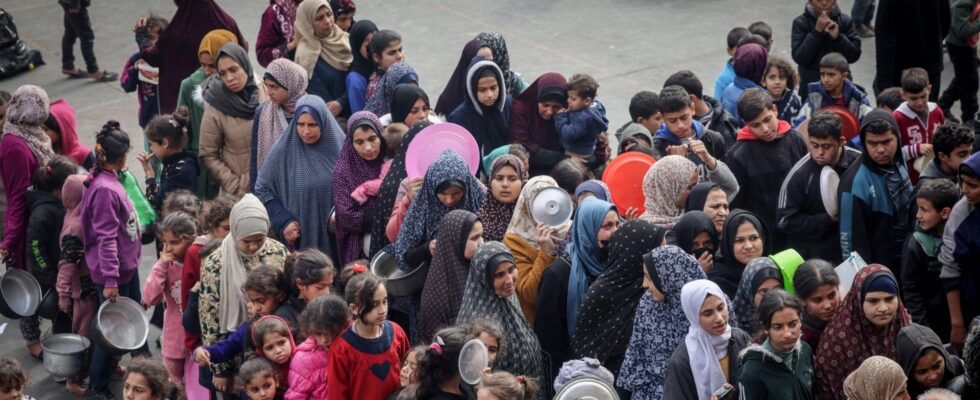Negotiations resume on Sunday in Cairo with a view to obtaining a truce between Israel and Hamas during Ramadan in Gaza, where deadly Israeli bombings continue in the Palestinian territory threatened with famine according to the UN. According to Egyptian pro-government media, representatives from Qatar and the United States have arrived in the Egyptian capital. There, Hamas envoys must “give them a response to the proposal developed in Paris” at the end of January, said a source close to Hamas.
This proposal from the mediating countries – Qatar, United States, Egypt – concerns a six-week pause in the fighting and the release of 42 hostages in exchange for that of Palestinians imprisoned by Israel. The aim is to achieve a truce before the start of the Muslim fasting month, which will begin on March 10 or 11 this year. “The Israelis have accepted in principle the elements of the agreement,” assured a senior American official in Washington on Saturday while Israel did not confirm this information.
A truce could be signed within “24-48 hours” if Israel “accepts Hamas’s demands, which include the return of displaced Palestinians to northern Gaza and an increase in humanitarian aid,” the Israeli news agency said on Sunday. AFP a senior Hamas official, on condition of anonymity. Hamas is also demanding a permanent ceasefire and an Israeli withdrawal in exchange for the release of hostages held in Gaza.
Information to remember:
- Negotiations resume on Sunday in Cairo to obtain a truce between Israel and Hamas during Ramadan in Gaza
- A truce could be signed within “24-48 hours”
- UN fears ‘almost inevitable’ famine in region
Famine “almost inevitable”
On the ground, several air strikes targeted the towns of Khan Younes and Rafah in the south during the night, according to an AFP correspondent in Gaza. Hamas also said heavy artillery fire targeted Jabaliya, Beit Hanoun, Zeitoun and Tal al-Hawa in the north. In nearly five months, Israeli military operations launched in retaliation for the unprecedented Hamas attack in Israel on October 7 have left 30,410 dead in the Gaza Strip, the majority civilians, the Health Ministry said on Sunday. He reported 90 deaths in 24 hours, including 14 members of the same family in a strike in Rafah.
The conflict has also caused a humanitarian catastrophe and famine is “almost inevitable” for 2.2 million people, the vast majority of Gaza’s population, according to Jens Laerke, spokesperson for OCHA, United Nations agency for the coordination of humanitarian affairs. The Ministry of Health has reported 16 children dying from “malnutrition and dehydration” in recent days.
66 “parcels”
Faced with the difficulties of transporting humanitarian aid by road in the territory sealed off by Israel, the United States carried out on Saturday a first airdrop of 66 “packages” containing more than 38,000 meals, in a joint operation with Jordan, according to an American military official.
The war was sparked by an attack carried out on October 7 in southern Israel by Hamas commandos infiltrated from Gaza, where the movement took power in 2007. This attack resulted in the deaths of at least 1,160 people, mostly civilians, according to an AFP count based on official Israeli data. Around 250 people were also kidnapped and, according to Israel, 130 hostages are still being held in the Gaza Strip, 31 of whom are believed to have died. A truce at the end of November allowed the release of 105 hostages in exchange for 240 Palestinian detainees. Israel has vowed to annihilate Hamas, which it considers a terrorist organization, along with the United States and the European Union.
Prime Minister Benjamin Netanyahu announced the upcoming launch of a major operation on Rafah, to defeat Hamas in its “last bastion”. This prospect worries the international community because the city is home to nearly 1.5 million Palestinians, the vast majority displaced, trapped against the closed border with Egypt.
“Unfounded” accusations
The UN Security Council on Saturday expressed “grave concern” over food insecurity in Gaza and called for the unhindered delivery of “large-scale” humanitarian aid. Cargoes by land, subject to the green light from Israel which has imposed a blockade on Gaza since 2007, only arrive in very limited quantities, mainly via Rafah, from Egypt. Their transport, particularly in the north of the territory, is perilous due to fighting, Israeli bombings, rubble blocking roads and sometimes looting. An aid distribution in Gaza City turned tragic on Thursday when several hundred people rushed onto humanitarian aid trucks.
Hamas claims the Israeli army opened fire on the hungry crowd. Israel spoke of “limited shooting” by soldiers who felt “threatened” but assures that the majority of victims were killed in a stampede and others crushed by trucks. The tragedy left 118 dead and 760 injured, according to Hamas and the international community has called for an investigation. A UN team said it found “a large number” of gunshot wounds in a hospital in the city where many victims had been admitted.
“To say that we attacked the convoy and deliberately hit people is baseless,” Israeli army spokesman Daniel Hagari said on Saturday.
Facilitate the entry of aid
Aid drops or possible deliveries by sea, another option studied by the United States, “cannot replace the necessary entry of aid by as many land routes as possible”, insisted a senior American official. Washington will “insist with Israel to facilitate the entry of more trucks,” said Joe Biden.
“We received two bags of flour from the aid that arrived on the day of the massacre in Gaza on Thursday,” says Hicham Abou Eïd, a 28-year-old resident of the Zeitoun neighborhood: “That’s not enough. Everyone is hungry. “Help is rare and insufficient.”
